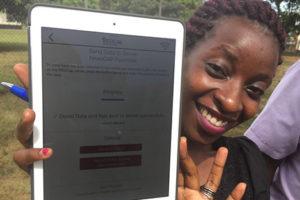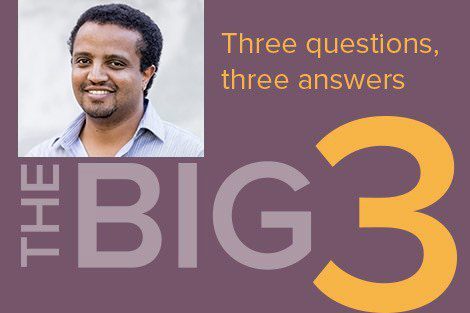August 19, 2019—The NeuroGAP-Psychosis study, led by Harvard T.H. Chan School of Public Health, the Broad Institute of MIT and Harvard, and partner institutions in Africa, is the first large-scale psychiatric genetics study of African populations. In February 2018, it began recruiting 35,000 people in Ethiopia, Kenya, South Africa, and Uganda to answer questions about their health, lifestyle, and mental health, and to donate saliva for DNA testing. Bizu Gelaye, assistant professor in the Department of Epidemiology, is associate director of the Global Initiative for Neuropsychiatric Genetics Education in Research (GINGER) training fellowship for African scientists, and a co-principal investigator with the NeuroGAP-Psychosis study.
What research gap does this study help fill, and how might its findings benefit African populations?
Psychiatric disorders are highly prevalent globally—including in Africa, where the disease burden is growing—but our current understanding of their genetic underpinning is largely based on Northern European samples. This leaves a big gap in what we know about the genetic and environmental risk factors for psychiatric disorders in persons of African descent, and limits our ability to produce optimal treatments for them.
An additional benefit from the study is that the genetic and epidemiological data we collect may contribute to improving mental health services in these countries. Ministries of health and governments are more likely to pay attention to mental health needs when there is research. There is nothing like local data to compel action for policy makers.
The study recently recruited its 10,000th participant. Why is that milestone significant, and what challenges have you faced during the recruitment process?

This milestone is significant because we are now at the point where we can collect the first saliva samples and do the first genome wide association study. We have achieved it thanks to the hard work and rigor that the principal investigators and research staff members at our partner institutions and here at the Harvard Chan School put into recruitment preparation and fieldwork.
Any global health effort is complex. Things as simple as transferring funds from one place to another can take three times longer than anticipated. Even standardizing data collection methods can be challenging because you have to do multiple translations of study instruments across countries. But a unique challenge for this study is the historical context that populations have not always benefited from genetics research. To counter this, we are taking great care to make sure that our African collaborators are part of all aspects of the research process—not just the data collection effort, but also data analysis. They have much more ownership than has been the case with other studies.
We also are making sure that the research has added value for African scientists by doing rigorous evaluations of the screening instruments. Hopefully, we will have validated tools that can be used in local clinical settings and in research beyond our study.
How is the study’s affiliated training program, GINGER, contributing to building genomics expertise in African countries?
Through the GINGER fellowship program, we are providing African scientists with training on genetics, biostatistics, and epidemiology, as well as around grant writing and career development. Fellows ultimately become trainers themselves, sharing what they’ve learned with their colleagues and boosting local capacity.
But we prefer the term “capacity sharing” to “capacity building.” There is a two-way street in engaging young scholars at Harvard Chan School and our African partner institutions through the program.
Photo: Kristi Post
Learn more
Read a commentary by Anne Stevenson, program director of the study (WBUR)
